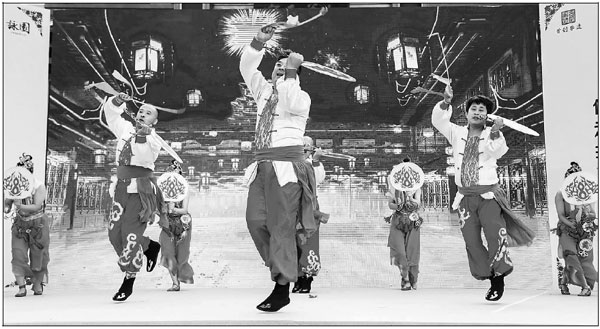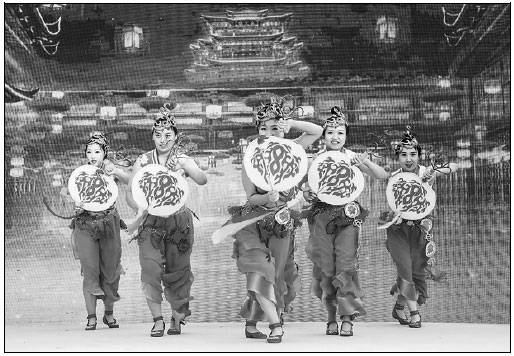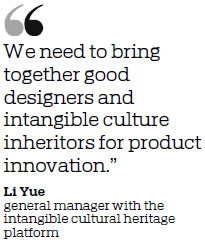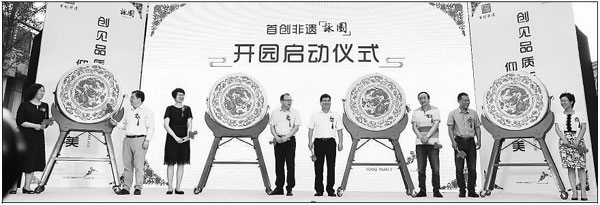Planting a cultural seed
A former cosmetics factory, the Sanlu Plant in Beijing has been repurposed to house, develop and protect the future of China's intangible cultural heritage, Yang Feiyue reports.
A former factory and Beijing landmark has been transformed into an intangible cultural heritage park in the capital's downtown.
Several modern-looking buildings and a big lawn at its heart easily set Yongyuan apart from its hutong surroundings.
Yongyuan park sits on Xingfu Street in Beijing's Dongcheng district where the Sanlu Plant, a well-known cosmetics manufacturer back in the '80s and '90s, once stood.

|
The Yongyuan park is set up to allow inheritors to work with designers and find ways to blend the traditional arts more seamlessly into public life. Photos Provided to China Daily |

The Sanlu Plant's Dabao skincare brand was a household name nationwide, and the plant developed more than 100 products in markets such as hair care and fragrances. It contributed over 100 million yuan ($14.57 million) to the economy in the 1990s, making it Beijing's number one taxpayer.
In 2003, the plant's cosmetics production line was transferred out of the city, leaving the land at the center of the capital open for new use.
The Sanlu Plant began its search for a tenant and in 2018, Hong Kong-listed Beijing Capital Land came in and decided to develop its cultural operations.
"The proprietor sympathizes with the concept of the cultural and creative industries, and intangible cultural heritage," says Li Yue, general manager with the intangible cultural heritage platform, which Beijing Capital Land established last year.
Li believes the ambience of the neighborhood makes it the ideal environment for the development of intangible cultural heritage.
The plant covers an area of 14,000 square meters and sits right next to the South Central Axis.
It's about 800 meters away from the iconic Hall of Prayer for Good Harvests at the Temple of Heaven. To the north of the plant's location, there even stands a century-old church.
Remodeling began in September.
"We conducted protective reinforcement of the original architecture, ensuring everything from a piece of wood to a stalk of grass remained the way it was 100 years ago," says Wang Leiming, an employee with the Beijing Capital Land's intangible cultural heritage platform.
All of those old buildings have undergone exterior remodeling and interior refits, but visitors can still touch the old red bricks that are exposed on its surface here and there.
A traditional tile structure was applied to the partitions in the park.
After months of construction, Yongyuan opened in late June.
The southern building which used to be Sanlu Plant's production area now serves a space for the high-end customization and innovation of intangible cultural heritage, while the eastern facility offers immersive exhibition experiences.

The building in the north has been transformed into a retail space, where visitors can buy products such as handmade bags and traditionally created art.
Yongyuan park will focus on the development of intangible cultural heritage. It was set up to allow inheritors to work with designers and find ways to blend the traditional arts more seamlessly into public life.
So far, many inheritors are confined to limited development space, says Li.
The cultural product concept falls behind the times and is separated from modern design and sales, he adds.
"We need to bring together good designers and intangible culture inheritors for product innovation," Li says.
During the opening ceremony of Yongyuan, Beijing Capital Land signed strategic cooperation agreements with a host of traditional art workshops, guilds and institutes of higher learning.
The Beijing company also aims to integrate investment, technological research and retail facilities to further promote Chinese intangible cultural heritage as well as investing in a 5 billion yuan cultural foundation.
The goal is to help every link in the intangible culture industry chain - from designers and inheritors to producers - to solve their problems and convert intangible culture into marketable products with a practical value, Li says.
When a product is created, the Beijing company will invest in its production, increase its added value and help it to gain market presence.
Li says Beijing Capital Land will also use its outlet shops across the country to promote products bearing elements of intangible culture.
To date, the company has also reached strategic agreements with several online retail giants, including Alibaba, JD and Vipshop, to boost sales of these products.
The goal is to enable customers to better appreciate the beauty of Chinese culture and to build uniquely Chinese cultural brand, Li says.
Authorities expect the park to become a testing ground for national efforts in intangible cultural heritage protection.
Wang Chenyang, an official at the Ministry of Culture and Tourism's intangible cultural heritage division, says that he hopes the park will provide opportunities to combine exciting cultural heritage products from all over China, and promote the upgrading of the traditional arts and facilitate in-depth cooperation between those involved in art creation, design and marketing.
Beijing currently has more than 12,000 municipal-level intangible cultural heritage practices, according to Li Yang, a senior official with the Beijing Municipal Culture and Tourism Bureau.
"We hope Yongyuan will become a new name in the capital's 'national cultural center' development in the future," Li Yang says.
The Beijing government issued guidance in June to support the development of platforms for cooperation in the fields of intangible cultural heritage, culture creation and health.
The guidance pushes for rational utilization of the city's historical buildings and former industrial sites, turning them into intangible cultural heritage halls for protection, research, publicity and academic exchange purposes, according to Li Yang.
Li Yang says that the Beijing culture and tourism authority will continue to come up with measures to grow the construction of facilities that protect intangible cultural heritage and offer better conditions for cultural inheritors.
So far, several masters of intangible culture have moved in, and the park is talking with more than 30 inheritors nationwide about some form of cooperation.
The park offers more than 30 spaces for traditional artists to meet guests and show their work.
Zhang Tiecheng, a Chinese arts and crafts master, is one of the first to move into Yongyuan.
His workshop at the park now presents a range of delicate jade items on sale to the public.
Zhang has engaged in the art of jade sculpting - an art form once practiced by ancient royal houses - for more than three decades.
He says that people are increasingly interested in the field because of its growing returns, but that has unfortunately led many inheritors of art to make items purely for money.
"For example, many artists will make bracelets because they are currently popular," Zhang says.
"But jade, after all, is non-renewable. If we all cut good material to make quick consumables, it would be pointless," he adds.
Zhang believes joining Yongyuan will allow for more thorough, long-term learning among artisans in his field and collaboration with designers who are more familiar with the market.
The ultimate goal is to better combine the art of jade sculpture with tasteful design and then help the public to gain a better appreciation for the beauty of this traditional art, Zhang says.
The China National Textile and Apparel Council has also settled in the park.
Handbags and clothes bearing elements of intangible culture are neatly placed at the council's workshop for visitors to appreciate and, if it tickles their fancy, purchase.
"We will mainly showcase products deriving from intangible cultural heritage innovation in the field of textiles," says Xia Jingjing, an employee with the textile council.
These products are selected from art masters working in the industry nationwide.
The council will also invite textile art masters to meet with designers and develop new products for the future, according to Xia.
"The Yongyuan office will also be a good platform to test the water and see what kinds of textile products appeal to consumer tastes," Xia says.
Contact the writer at yangfeiyue@chinadaily.com.cn
(China Daily Global 07/23/2019 page14)



















